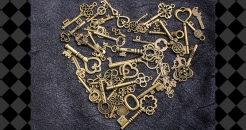 The Legacy of Faith Driven Business
The Legacy of Faith Driven Business
From a talk at Stronger 2025
Dayalan Mahican is a West London-based entrepreneur and coach, passionate about helping small businesses thrive and influence their communities. At the Stronger Network's Stronger 2025 event, Dayalan spoke about the legacy of faith-driven businesses and their principles referring to some examples.
Here is an abridged version:
A Kingdom business is one that seeks to operate on principles and values drawn from and consistent with the revelation of God's word. Another definition is that faith-driven businesses are entities set up to intentionally glorify God, make a profit, support the work of Christ and spiritually impact your sphere of influence.
With faith-driven businesses, you can either explicitly say that our businesses is to do with our faith or not. There's no right or wrong way. For example, Chick-Fil-A have 'our vision is to glorify God by being a faithful steward of all that is entrusted to us' in their mission statement. So that's very explicit. There's plenty of other businesses that aren't as explicit but that still doesn't deter from the fact that they are very strong faith-driven businesses and they're there to glorify God.
The main point I want to get across in the examples I give, is that they involve ordinary people. Whether you're a business person or you're looking to get into business, we're all ordinary people. We might not be the most qualified, the most wealthy or the most connected but that's the same with each of the people in the examples. They were all used by God beyond their wildest dreams.
Henry Heinz was obsessed with learning and experimenting. At young age, he would work in his mum's garden farm, learning about farming. He really wanted to save people time, so he started to pack up some horseradish and pickles, and sell it to all the neighbours. He started with a little basket and then he got a cart and then a wagon. He was a teenager by then and in a recession, he went bankrupt.
However, one thing he did was set up a a moral obligation book of all his creditors. Even though he didn't need to pay any of his creditors back because he had gone bankrupt, he still was going to do it and also make sure he never made the same mistake again.
He went on to set up a new business but the first thing he did for the next few years was paying back all the creditors he owed from the last business. He had a really good reputation as a result. His company grew very quickly. He invited people to come into his factories to see how it was run. He used clear bottles to show how pure his products were. He was very gracious to his staff when they made mistakes. His famous products sold across the USA and internationally - going global before other well-known US brands. Before he died, he set up foundations to make sure that the money was going to many good causes.
Henry Heinz would always try to prioritize Sunday school and the local church. When he got an opportunity to ship his product to the Far East, he was he was specifically looking at setting up Sunday schools and churches there as well. In his biography somebody wrote of him, he did more for the church without being in it (professionally).
[WOTS - Dayalan then talked about George Cadbury and Quakers - see this previous article: Quaker Values and Innovation.]
Hobby Lobby in America (similar to Hobby Craft in the UK) was set up by David Green. He grew up in a very devout Christian household - all his siblings became full-time pastors. He started working in a craft shop, then bought a wood saw and started making picture frames. He opened a store and just kept expanding to over 1000 stores. Every store had short staff hours, were closed on Sundays, staff meetings started with prayer, asked staff if they wanted to become Christians. David made sure that he was not owning the business - he and his family were stewards of the business on God's behalf. No matter how big they got, they still maintained a family culture - protecting Sundays and insisting on time for staff to go home to put their kids to bed.
Horst Schulze was trained in hotels in Germany. His family were quite embarrassed - they didn't really look at that as a proper profession. He started with cleaning duties. Later he worked in in America for Hilton and then set up his own luxury hotel - the Ritz Carlton which went on to do really well. He felt strongly that God wanted him to set-up his own hotel chain but, after a couple of years, he started to doubt it and he said to his wife he might pack it in. His wife said, "Why would you want to argue with God? We know that this is God's Will." The chain expanded all over the world.
The hotels were always centred on excellence and impeccable customer service. Horst treated his staff really really well knowing that that was the key for them to then treat clients very well. He would always quote St Benedict's guide to hospitality when he was training his staff - it simply says, when a guest arrives treat them like it was Jesus himself. He had this motto, "Ladies and gentlemen serving ladies and gentlemen." They became the number one luxury hotel brand in the world for several years.
Watch the full 23 minute talk here:
Retweet about this article:
From a talk at Stronger 2025, 03/09/2025